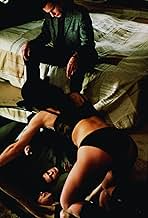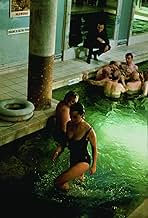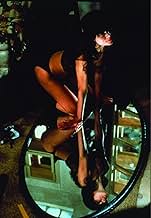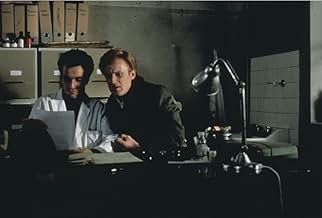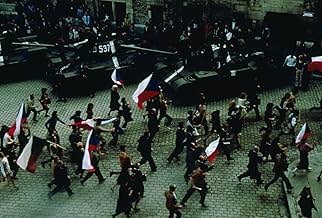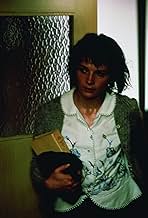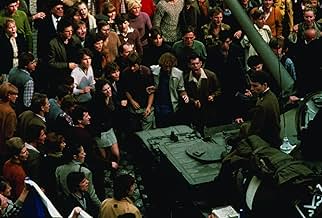A doctor in 1968 Prague struggles with monogamy to his wife's frustration, and then the Soviet invasion further disrupts their lives.A doctor in 1968 Prague struggles with monogamy to his wife's frustration, and then the Soviet invasion further disrupts their lives.A doctor in 1968 Prague struggles with monogamy to his wife's frustration, and then the Soviet invasion further disrupts their lives.
- Director
- Writers
- Stars
- Nominated for 2 Oscars
- 7 wins & 14 nominations total
Pavel Landovský
- Pavel
- (as Pavel Landovsky)
Stellan Skarsgård
- The Engineer
- (as Stellan Skarsgard)
Tomasz Borkowy
- Jiri
- (as Tomek Bork)
Pavel Slabý
- Pavel's Nephew
- (as Pavel Slaby)
László Szabó
- Russian Interrogator
- (as Laszlo Szabo)
- Director
- Writers
- All cast & crew
- Production, box office & more at IMDbPro
7.240.3K
1
2
3
4
5
6
7
8
9
10
Featured reviews
A lack of philosophy
The best thing about the novel was that the events were more meaningful because along with each event came a piece of the author's philosophy which made not only the plot seem whole but the author's main philosophical argument materialize more and more as we read on.
The movie was only a documentation of the plot and because it was a movie I guess it could only "lightly" touch upon the author's philosophy. Maybe a narrator in the background could have filled us in? I watched the movie not because I enjoyed the plot but because I enjoyed reading the author's ideas about life. They weren't as evident in the movie, but I gave a 6 because the acting and cinematography were good.
The movie was only a documentation of the plot and because it was a movie I guess it could only "lightly" touch upon the author's philosophy. Maybe a narrator in the background could have filled us in? I watched the movie not because I enjoyed the plot but because I enjoyed reading the author's ideas about life. They weren't as evident in the movie, but I gave a 6 because the acting and cinematography were good.
Personal meaning in love, in expression, and between ordinary people
The Unbearable Lightness of Being (1988)
I liked this book a lot, and I like director Philip Kaufman's approach to movies. The best of this movie is terrific, as well: the wild culture of personal and cultural freedom at the start, the chilling invasion of Soviet tanks in the center, and the last half hour of idealized romance and happiness in the country.
That kind of gives away the movie, it would seem. But in a way, the movie is about how all these things happen. This is where it gets to be about taste and patience. It's a long movie, and much of the events are not really a development of plot, but a steady continuation of a variety of relationships (mainly between the lead man and the two main women). There is a plot behind all this, especially around their leaving Czechoslovakia and then finding a return to bliss in the Czech countryside, but this doesn't drive the movie overall.
For me, it wasn't enough to see these people enjoying sex and discovering conflicts between the three legs of the love triangle. Scenes were often leisurely in a way that implies we were glad to just be there and watch things happen within a pocket of frozen time, rather than through time. By that I mean, it wasn't where you were going with the emotional aspects, but it was where you were, the now of the interactions. The might actually be where the book was so successful--it created moods and scenes where you were, actually, glad to just be absorbed. For me, that wasn't always the case in the film version.
Part of the problem might just be Daniel Day Lewis, who is a bit too self-satisfied, not as a character (that is certain) but as an actor. He lacks the magnetism that might sustain the unlikely and ongoing love the two women have for him, even as they know about each other. On the other hand, it's a huge, epic tale about true freedom, and a very real pursuit of happiness. And when the energy gets going, and the mood is fully expanded, there is magic. Especially, again, at the end, including the famous fade to white in the last frames, it is about a kind of heaven on earth. Who can object to that?
I liked this book a lot, and I like director Philip Kaufman's approach to movies. The best of this movie is terrific, as well: the wild culture of personal and cultural freedom at the start, the chilling invasion of Soviet tanks in the center, and the last half hour of idealized romance and happiness in the country.
That kind of gives away the movie, it would seem. But in a way, the movie is about how all these things happen. This is where it gets to be about taste and patience. It's a long movie, and much of the events are not really a development of plot, but a steady continuation of a variety of relationships (mainly between the lead man and the two main women). There is a plot behind all this, especially around their leaving Czechoslovakia and then finding a return to bliss in the Czech countryside, but this doesn't drive the movie overall.
For me, it wasn't enough to see these people enjoying sex and discovering conflicts between the three legs of the love triangle. Scenes were often leisurely in a way that implies we were glad to just be there and watch things happen within a pocket of frozen time, rather than through time. By that I mean, it wasn't where you were going with the emotional aspects, but it was where you were, the now of the interactions. The might actually be where the book was so successful--it created moods and scenes where you were, actually, glad to just be absorbed. For me, that wasn't always the case in the film version.
Part of the problem might just be Daniel Day Lewis, who is a bit too self-satisfied, not as a character (that is certain) but as an actor. He lacks the magnetism that might sustain the unlikely and ongoing love the two women have for him, even as they know about each other. On the other hand, it's a huge, epic tale about true freedom, and a very real pursuit of happiness. And when the energy gets going, and the mood is fully expanded, there is magic. Especially, again, at the end, including the famous fade to white in the last frames, it is about a kind of heaven on earth. Who can object to that?
Too uneven and too long - but with great performances
Although the screenplay is based on the great and world-famous book by Milan Kundera, it was written by others (Jean-Claude Carrière and the director Philip Kaufman) and thus lost its original touch and approach - as was pointed out by Kundera himself who withdrew from the outcome. On the other hand, fragile feelings, ponderings and internal doubts are very difficult to express on the screen - without losing the pace and uniformity of the plot. It is also pity that Prague was not / could not been used, as it is a beautiful city and gives more realism than the French places used. Depicion of the socialist/communist oppression is, however, rather perfunctory, seeming not so serious as it really was in the 1970ies within the Warsaw block when hopes of intellectuals for the so-called human-faced socialism vanished as liberal steps were diminished or repealed.
The cast is, of course, brilliant, in particular the bohemian ménage à trois members: Daniel Day-Lewis as Tomas, Juliette Binoche as Tereza and Lena Olin as Sabina - all later multiple Academy Award winners and/or nominees, and from different European countries (the movie itself is still the US one). They and some other fine European actors have provided the movie a real European atmosphere, without a Hollywood studio feeling as sometimes perceived in "older" movies.
Nevertheless, The Unbearable Lightness of Being is still a movie high above average, enhancing historical facts as well. But it is hard to say whether is is recommendable to read the book before or after...
The cast is, of course, brilliant, in particular the bohemian ménage à trois members: Daniel Day-Lewis as Tomas, Juliette Binoche as Tereza and Lena Olin as Sabina - all later multiple Academy Award winners and/or nominees, and from different European countries (the movie itself is still the US one). They and some other fine European actors have provided the movie a real European atmosphere, without a Hollywood studio feeling as sometimes perceived in "older" movies.
Nevertheless, The Unbearable Lightness of Being is still a movie high above average, enhancing historical facts as well. But it is hard to say whether is is recommendable to read the book before or after...
Only what is heavy has value
Imagine you're at the theater attending a live performance, a truly living performance in which both axioms and mythological truths are entered into and shared by actors and audience alike. Now suppose that the backdrop for all the action is dark, oppressive, and heavy, while all that transpires before it is light, glib, and ineffectual. Now consider that, through the course of the play, all that is bouncy and trivial becomes overwhelmed and absorbed by the gravity of the background, like light being sucked into the gravity of a black hole, so that what was once meaningless and unimportant and even silly becomes increasingly momentous and important and valuable as the play progresses. If you can see this outline in your mind's eye, you have a good idea about The Unbearable Lightness of Being, Milan Kundera's novel by the same name brought to life as a movie. The film, like the novel, declares one thing: `only necessity is heavy, and only what is heavy has value.' I so love this idea, this earth shattering insight: it effortlessly capsizes our Postmodern zeitgeist in one innocuous little phrase. And the film expresses it beautifully.
Set in the Prague Spring of 1968, when the Soviets put down Dubcek's `Socialism with a Human Face,' the weight of these events draws the lives of a Czech doctor, his wife, and his lovers, into its orbit. And instead of crushing them, as one might assume, it becomes the fire that purifies gold. Tomas (Daniel Day-Lewis), for example, had previously written a treatise on Oedipus, a witty exercise in sophistry aimed at the Communist regime as a provocative analogy, nothing more. But as the essay becomes an object of obsession to the Communists, we see Kundera's definition of vertigo come into play. It is not the fear of falling, but the soul's defense against the desire to fall. Tomas wanted to fall. Why? Watch the movie, and find out for yourself.
Set in the Prague Spring of 1968, when the Soviets put down Dubcek's `Socialism with a Human Face,' the weight of these events draws the lives of a Czech doctor, his wife, and his lovers, into its orbit. And instead of crushing them, as one might assume, it becomes the fire that purifies gold. Tomas (Daniel Day-Lewis), for example, had previously written a treatise on Oedipus, a witty exercise in sophistry aimed at the Communist regime as a provocative analogy, nothing more. But as the essay becomes an object of obsession to the Communists, we see Kundera's definition of vertigo come into play. It is not the fear of falling, but the soul's defense against the desire to fall. Tomas wanted to fall. Why? Watch the movie, and find out for yourself.
One of the finest works of the '80s.
Using the Prague Spring of 1968 as a backdrop, The Unbearable Lightness of Being weaves a story of three very real artists and their journey through love, sex and revolution. The film begins by introducing us to Tomas (Daniel Day-Lewis) a very charming womanizer and very intelligent, political doctor. Through all of his one night stands and emotionless sexual encounters, he only has one real lover; Sabina (Lena Olin) is a seductive, carefree artist. When Tomas gets a call to perform an operation in a spa town, he meets the woman of his dreams; Tereza (Juliette Binoche) the shy waitress who dreams of leaving her dull, unchallenging life and heading to a place with intellectuals. When Tomas heads back to Prague, she shows up at his door and they quickly move in together.
This move changes his life completely. He no longer has numerous flings and one night stands, but instead only makes time for Tereza at home and Sabina on the side. When Tomas begs Sabina to provide Tereza with a job, the three embark on a journey of sexual tension, intellectual discussion and artistic wonder. However this love triangle is cut short as Soviet tanks come roaring through Czechoslovakia endangering the freedom of all three characters, who then decide to flee to Switzerland. By this time Tomas and Tereza have been long married, and Sabina meets a new man in the form of Franz (Derek de Lint) a married man who eventually leaves his wife and family for her. The danger of commitment drives Sabina away and she moves to the United States, disappearing for the entire third act of the film.
It's this act that is the most interesting, as it truly examines Tomas and Tereza's tumultuous relationship. Tereza realizes that she is too dependant on him, while he could leave her at any time so she moves back to the now Soviet-controlled Prague and Tomas' love for her drives him to return there. Of course Tomas' political values, including an article he wrote criticizing the Soviet Union and 'implying' that they should all pluck their eyes out doesn't shine too well with the Soviets and they ask him to sign a letter to repudiate his article. Tomas is too proud and declines this offer, which leads to him losing his license and he has to settle to becoming a lowly window washer. But he can't hide his womanizing desires, and his infidelity drives Tereza to the same crime. Eventually her shame and the potential of her awkward lover being a Soviet who will blackmail the couple leads to the two of them moving to a rural village and living their life their together.
The most beautiful and romantic elements of the film are portrayed once they move to the village. Without the temptation of infidelity and the power of political intrigue, their life becomes euphoric and simple. Tomas works in the field all day, while Tereza cooks and cleans and they are never too far away from one another. During a trip to a relatively local bar, Tomas is presented with the opportunity of an affair but quickly brings his gaze back to Tereza showing that he is finally complete with her. This blissful relationship provides overwhelming satisfaction and closure to the chaotic life they had led up to this point.
Highlighting this impeccable picture are three sensational performances, a masterfully adapted screenplay full of beautiful and intriguing dialogue and quite possible the finest cinematography of the '80s. Day-Lewis perfectly encompasses the charm of Tomas with a subtle charisma that keeps my eyes glued to him every time he appears on screen. The young Juliette Binoche is adorable, shy and emotionally powerful but also plays it off very subtly. Lena Olin is overwhelmingly seductive and crafts a sense of freedom unlike any I've ever seen. These characters are all very human which means they have their fair share of flaws and the performances capture every essence of them so perfectly.
This move changes his life completely. He no longer has numerous flings and one night stands, but instead only makes time for Tereza at home and Sabina on the side. When Tomas begs Sabina to provide Tereza with a job, the three embark on a journey of sexual tension, intellectual discussion and artistic wonder. However this love triangle is cut short as Soviet tanks come roaring through Czechoslovakia endangering the freedom of all three characters, who then decide to flee to Switzerland. By this time Tomas and Tereza have been long married, and Sabina meets a new man in the form of Franz (Derek de Lint) a married man who eventually leaves his wife and family for her. The danger of commitment drives Sabina away and she moves to the United States, disappearing for the entire third act of the film.
It's this act that is the most interesting, as it truly examines Tomas and Tereza's tumultuous relationship. Tereza realizes that she is too dependant on him, while he could leave her at any time so she moves back to the now Soviet-controlled Prague and Tomas' love for her drives him to return there. Of course Tomas' political values, including an article he wrote criticizing the Soviet Union and 'implying' that they should all pluck their eyes out doesn't shine too well with the Soviets and they ask him to sign a letter to repudiate his article. Tomas is too proud and declines this offer, which leads to him losing his license and he has to settle to becoming a lowly window washer. But he can't hide his womanizing desires, and his infidelity drives Tereza to the same crime. Eventually her shame and the potential of her awkward lover being a Soviet who will blackmail the couple leads to the two of them moving to a rural village and living their life their together.
The most beautiful and romantic elements of the film are portrayed once they move to the village. Without the temptation of infidelity and the power of political intrigue, their life becomes euphoric and simple. Tomas works in the field all day, while Tereza cooks and cleans and they are never too far away from one another. During a trip to a relatively local bar, Tomas is presented with the opportunity of an affair but quickly brings his gaze back to Tereza showing that he is finally complete with her. This blissful relationship provides overwhelming satisfaction and closure to the chaotic life they had led up to this point.
Highlighting this impeccable picture are three sensational performances, a masterfully adapted screenplay full of beautiful and intriguing dialogue and quite possible the finest cinematography of the '80s. Day-Lewis perfectly encompasses the charm of Tomas with a subtle charisma that keeps my eyes glued to him every time he appears on screen. The young Juliette Binoche is adorable, shy and emotionally powerful but also plays it off very subtly. Lena Olin is overwhelmingly seductive and crafts a sense of freedom unlike any I've ever seen. These characters are all very human which means they have their fair share of flaws and the performances capture every essence of them so perfectly.
Did you know
- TriviaThe first cut shown to the studio was under two hours in length and the story was confusing. Philip Kaufman was asked to add in scenes he cut. The next day they were shown the theatrically released version. It's believed Kaufman showed them a shorter and confusing version in order to get his almost three-hour final cut approved with no questions of cutting it.
- GoofsMephisto the Pig, consistently referred to as "he", is a sow, as can be seen frequently, but particularly when the group enters the inn for dancing.
- How long is The Unbearable Lightness of Being?Powered by Alexa
Details
- Release date
- Country of origin
- Official sites
- Languages
- Also known as
- La insoportable levedad del ser
- Filming locations
- Prague, Czech Republic(archive footage)
- Production company
- See more company credits at IMDbPro
Box office
- Budget
- $17,000,000 (estimated)
- Gross US & Canada
- $10,006,806
- Opening weekend US & Canada
- $202,189
- Feb 7, 1988
- Gross worldwide
- $10,006,806
- Runtime
- 2h 51m(171 min)
- Color
- Sound mix
- Aspect ratio
- 1.85 : 1
Contribute to this page
Suggest an edit or add missing content


